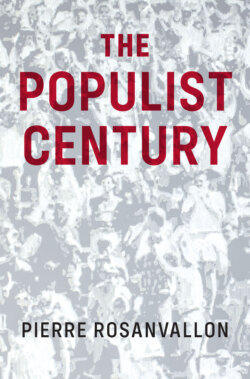Читать книгу The Populist Century - Pierre Rosanvallon - Страница 25
The leader as an organ of the people’s body
ОглавлениеUntil fairly recently, the examples of populism from Latin America still had an “exotic” aspect. But the increasing strength of populisms clearly shows that appreciation of the leader as “embodying the people” belongs to a vision of political representation that characterizes populisms in general. During the 1995 French presidential campaign, the Front National put the slogan “Le Pen, le peuple” on its posters. The matter was theorized later on by Ernesto Laclau and Chantal Mouffe, who had been recognized as the intellectual organs of left-wing populist tendencies. Laclau stressed that, “as a condition of its emergence, populism requires verticality of a new type. The people, as a collective actor, has to shape itself around a certain identity. But that identity is not automatic: it must be constructed.”8 This means, for Laclau, that alongside the “horizontal expressions of democratic equivalencies” there has to be a “vertical articulation around a hegemonic signifier that, in most cases, is the name of a leader.”9 Mouffe has the same view: “To turn heterogeneous demands into a collective will it’s necessary to have a figure who can represent that unity, and I don’t think there can be a populist movement without leadership, that’s for sure.”10
Formulated by writers on the left, these assertions provoked a certain discomfort. But they were vigorously defended by their authors, who contrasted the type of leadership they were calling for with “the very authoritarian relation” that characterized, as they saw it, the relationships between a people and its leader in right-wing forms of populism. But that is a weak argument, based simply on a priori circumstances. Their thoughts about the specificity of the leader embodying the people are more interesting. For Laclau and Mouffe and others, this is a leader who exists as such only if he effectively embodies the lives and demands of those he represents: in short, only if he manifests a real power of embodiment. In that case, he can be said to be ideally a depersonalized leader, a pure representative, a figure totally absorbed in his role, thus far removed from the expression of a personality cult and from the relation of domination that such a cult implies.11 I emphasize “ideally” here: from this standpoint the leader can be viewed as a pure organ of the people.12 He is not only the chosen one or the delegate, that is, the representative in the procedural sense of the term: it is he who renders the people present in the figurative sense; it is he who gives the people a form and a face. If increased personalization of political life is a universal phenomenon tied to the preeminence acquired by the executive authority (whereas the legislative authority is always vested in a plural body), there is a properly populist specificity in the figure of the leader as organ.
In this regard, the straightforward declarations of a Jean-Luc Mélenchon are significant: “I am of the people. That is all I want to be, and I feel only scorn for those who would like to be something more.”13 The same Mélenchon exclaimed, while visiting the Forum in Rome in 2017: “Caesar was close to the people. The patricians, the enemies of the people, were the ones who assassinated him. It is interesting to see Caesar as a figure of the people.”14 Here Mélenchon is observing that politics implies more than ever the need to “construct a collective affect” even while deeming it necessary at the same time to “deconstruct it in order to anchor rational choices.” This is a Mélenchon finding the personalization of power sincerely “intolerable” and simultaneously seeking to keep on plowing the “tribunist furrow,” a Mélenchon at once hesitant and determined to resume the garb of leader embodying a people with which he had entered politics. Questioned about how he thought he could enlist the support of ordinary people, he answered: “[As] myself. You can identify with me . . . The people I meet in the street, on the bus, in the metro, feel instinctively the one who is ‘with us.’”15 This way of conceiving representation via embodiment is found throughout the populist galaxy. Even Donald Trump did not hesitate to say, during his acceptance speech at the 2016 Republican Convention: “I am your voice.”16 Laying claim to such an identification is a program in itself. Beyond the formulation of proposals for reform, the defining feature of populist policy is thus that it is grounded in embodied speech that has what might be called an existential dimension, speech that is addressed to the emotions as much as to reason. We shall come back to this crucial point.
